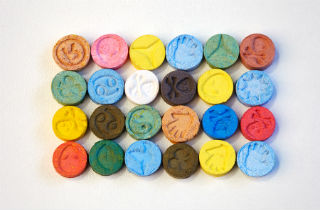The dangers of Molly — in the dance club scene and the teen party scene — include psychological compulsion to use as well as dehydration, hyperthermia, medical complications, and even death. But are these dangers for real or just scare tactics?
For example, can you really die from Molly? And are addictive qualities of Molly clinically possible? We review here, with a case study outlining one teen’s story. Then, we invite your questions or comments about MDMA or treating addiction to ecstasy at the end.
Molly is NOT MDMA
MDMA in its pure form, when used in a benign or clinical setting and with proper intention, may have its merits. But the simple fact is that over ninety percent of the drugs marketed as Molly are fake.
The counterfeit versions are much more of a problem. Combinations of drugs used to mimic MDMA include various amounts of cathinone (a stimulant known as “bath salts”), amphetamine, cocaine, and even crushed up pain pills such as oxycodone. These combinations, once used to counterfeit Ecstasy (the original street name for MDMA) have been re-branded as Molly.
Complications from ingesting theses drugs under the name of Molly have put people in emergency rooms at a rate that increased by over 100% between 2004 and 2011. Behavioral changes are not well reported, but many users—burnt out on being hyper-stimulated—turn to opiates, as did one adolescent in his late teens (see the story below).
Still, MDMA is NOT benign
Even pure MDMA can be dangerous: it can cause dehydration and hyperthermia, which can lead to medical complications and even death. A young woman at a recent electronic dance music event died from taking nine capsules that turned out to have been pure MDMA.
Jake’s story: Straight edge to almost daily MDMA user
Michael and Karen’s son, Jake, was a high school honors student and JV basketball starter. He had never taken a drug in his life, and when he was sixteenhad signed a contract with his parents—two alcoholics with long-term recovery—for a cash bonus at his 18th birthday if he refrained from even trying drugs or alcohol. Shoplifting and group sex were in the contract is well. Jake wanted to backpack with his friends in Europe when he graduated, so the bonus was an attractive one. And, he was content as a drug-free surfer and athlete. He frequently expressed how lucky and happy he felt. He also was observant about peers that started experimenting and how quickly their lives changed for the worse.
At seventeen and a half, still abstinent (and having put in a lot of time as a designated driver), Jake was at a New Year’s Eve party, and for some reason curiosity and peer pressure carried more weight than the contract. He smoked his first joint and had a few beers and enjoyed himself immensely. Ironically, his parents had always suspected that if he found a substance that would “ring his bell,” he would run with it.
Behavioral changes caused by MDMA use
Within a few months, Jake was dealing weed at his high school, had dropped off the basketball team, and had been called to the counselor’s office numerous times. After a dispute with his parents, he moved into an apartment with an older drug user, who introduced him to Molly, an amphetamine analog that produces — in its original, pure form as a compound called MDMA — euphoria and a deep sense of connectness with others, especially if they are also under its influence.
After two months of almost daily use of Molly, Jake found himself in a drug bust and was returned—because he was under 18—to his parents’ custody. He was a different person. He had difficulty focusing his thoughts, slept eighteen hours a day, was irritable and depressed, and would occasionally go into such rages that his father had to direct him outside, where he would beat on an old closet door with an aluminum baseball bat.
Molly: Are you really getting MDMA?
As there’s no way to verify what’s really in a street drug, is it worth the risk? We invite your questions and feedback in the comments section below. We try to respond to all legitimate comments with a personal and prompt reply.









Related Posts